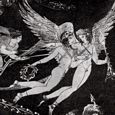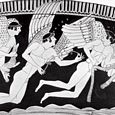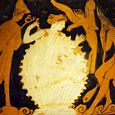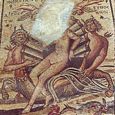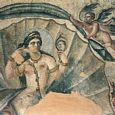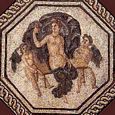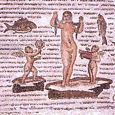HIMEROS
Greek Name
Ἱμερος
Transliteration
Himeros
Latin Spelling
Himerus
Translation
Desire, Longing, Yearning

HIMEROS was the god of sexual desire and one of the Erotes, the winged gods of love. When Aphrodite was born from the sea-foam's she was greeted by the twin loves Eros and Himeros. Some say Aphrodite was born pregnant with the twins and birthed them as soon as she was born. The pair remained her constant companions acting as agents of her divine power.
Himeros was depicted as winged youth or child. He often appears alongside Eros in scenes of Aphrodite's birth, fluttering around the goddess as she reclines in her conch-shell bed. At others times he appears as one of a triad of love gods with Eros and Pothos (Love and Passion). When paired with Eros he was perhaps identified with Anteros (Reciprocal Love).
FAMILY OF HIMEROS
PARENTS
[1.1] APHRODITE (born together with the goddess?) (perhaps suggested in Hesiod Theog 176)
[1.2] APHRODITE (Ovid Fasti 4.1)
ENCYCLOPEDIA
HI′MERUS (Himeros), the personification of longing love, is first mentioned by Hesiod (Theog. 201), where he and Eros appear as the companions of Aphrodite. He is sometimes seen in works of art representing erotic circles; and in the temple of Aphrodite at Megara, he was represented by Scopas, together with Eros and Pothus. (Paus. i. 43. § 6.)
Source: Dictionary of Greek and Roman Biography and Mythology.
CLASSICAL LITERATURE QUOTES
HIMEROS GOD OF DESIRE
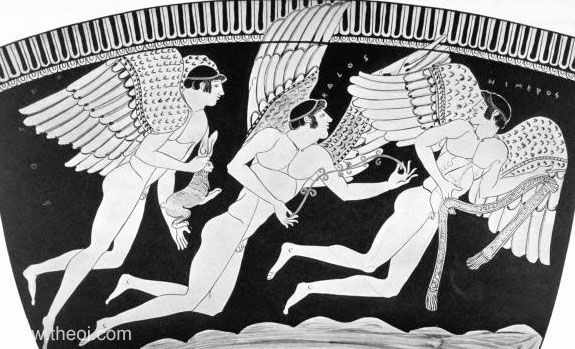
Hesiod, Theogony 176 ff (trans. Evelyn-White) (Greek epic C8th or C7th B.C.)
:
"And with her [Aphrodite] went Eros, and comely Himeros (Desire) followed her at her birth at the first and
as she went into the assembly of the gods."
Hesiod, Theogony 53 ff :
"A little way from the topmost peak of snowy Olympos, there are their [the Mousai's (Muses')] bright
dancing-places and beautiful homes, and beside them the Kharites (Charites, Graces) and Himeros (Desire) live in
delight."
Pindar, Eulogies Fragment 122 (trans. Sandys) (Greek lyric C5th B.C.) :
"Aphrodite the heavenly mother of Erotes (Loves)."
Pindar, Dirges Fragment 128 :
"May I delight in the graces of Aphrodisian Erotes (Loves)."
Sappho, Fragment 194 (from Himerius, Orations) (trans. Campbell, Vol. Greek Lyric I)
(Greek lyric C6th B.C.) :
"[The rites of Aphrodite :] After the contests [mock contests of suitors] she goes into the bridal chamber,
garlands the room and makes up the bed, then she gathers the girls into the bridal room and brings in Aphrodite
herself on the Kharites' (Charites', Graces') chariot with her chorus of Erotes (Loves) to join in the fun. She
binds Aphrodite's hair in hyacinth . . . she adorns the Erotes' wings and tresses with gold and urges them on in
procession before the chariot, waving their torches in the air."
Anacreon, Fragment 445 (trans. Campbell, Vol. Greek Lyric II) (Greek lyric C6th B.C.)
:
"[To the Erotes (Loves) :] You are violent and wicked, and you do not know against whom you will hurl your
weapons."
Anacreon, Fragment 445 (from Himerius, Orations) :
"Anakreon tuned his lyre and threatened that if the Erotes (Loves) did not at once wound the youth, he
would never again strike up a song in their praise."

The Anacreontea, Fragment 4 (trans. Campbell, Vol. Greek Lyric II) (Greek lyric C5th
or 4th B.C.) :
"Put vines on it for me [a cup crafted in silver by Hephaistos] with bunches of grapes on them . . . the
Satyroi (Satyrs) laughing, Erotes (Loves) all in gold, Kythere [Aphrodite] laughing together with handsome
Lyaios (Lyaeus) [Dionysos], Eros (Love) and Aphrodite."
The Anacreontea, Fragment 5 :
"Erotes (Loves) unarmed and laughing Kharites (Charites, Graces)."
The Anacreontea, Fragment 23 :
"My lyre sings only of the Erotes (Loves)."
The Anacreontea, Fragment 25 :
"Eros (Love) is always weaving his nest in my heart : one Pothos (Desire) is getting his wings, another is
still an egg, another is half-hatched already; and there is a continuous shouting from the wide-mouthed chicks;
little baby Erotes (Loves) are fed by bigger ones, and when fully grown they immediately beget others in their
turn."
The Anacreontea, Fragment 38 :
"Let us be merry and drink wine and sing of Bakkhos (Bacchus) [Dionysos], the inventor of the choral dance,
the lover of all songs, leading the same life as the Erotes (Loves), the darling of Kythere (Cytherea)
[Aphrodite]."
The Anacreontea, Fragment 35 :
"The soft rose. It is the breath of the gods and the joy of mortals, the glory of the Kharites (Charites,
Graces) in spring-time, the delight of the Erotes (Loves) with their rich garlands and of Aphrodite; it is a
subject for poetry and the graceful plant of the Mousai (Muses)."
The Anacreontea, Fragment 44 :
"Let us mix the Erotes' (Loves') rose with Dionysos : let us fasten on our brows the rose with its lovely
petals and drink, laughing gently. Rose, finest of flowers, rose, darling of spring, rose, delight of the gods
also, rose with which Kythere's (Cytherea's) son [Eros, Love] garlands his lovely curls when he dances with the
Kharites (Charites, Graces)."
Simonides, Fragment 67 (trans. Campbell, Vol. Greek Lyric III) (Greek lyric C6th to
5th B.C.) :
"Who tuned his lyre for songs of the sweet love of boys, songs with the scent of the Kharites (Charites,
Graces) and Erotes (Loves)."
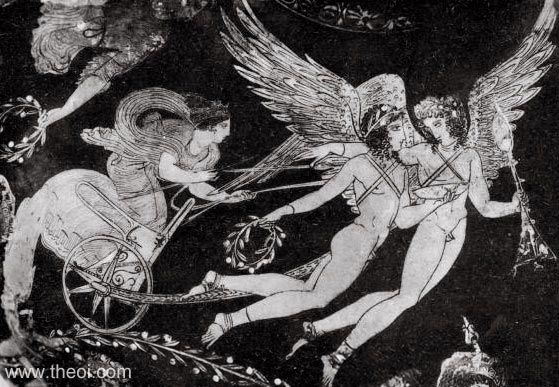
Bacchylides, Fragment 9 (trans. Campbell, Vol. Greek Lyric IV) (Greek lyric C5th
B.C.) :
"Golden violet-crowned Kypris (Cypris) [Aphrodite], to praise her, mother of the infexible Erotes
(Loves)."
Ion of Chios, Fragment 744 (trans. Campbell, Vol. Greek Lyric IV) (Greek lyric C5th
B.C.) :
"The untamed child (Wine), bull-faced, young and not young, sweetest attendant of loud-roaring Erotes
(Loves), wine that makes thoughts soar, ruler of mankind."
Greek Lyric V Folk Songs, Fragment 864 (from Lucian, On Dancing) (trans. Campbell,
Vol. Greek Lyric V) :
"The song sung by the Spartans while dancing is an invitation to Aphrodite and the Erotes (Loves) to revel
and dance along with them."
Plato, Cratylus 400d & 419e - 420b (trans. Lamb) (Greek philosopher C4th B.C.)
:
"[Plato invents philosophical etymologies to explain the names of the gods :]
Sokrates (Socrates) : Let us inquire what thought men had in giving them [the gods] their names . . . The first
men who gave names [to the gods] were no ordinary persons, but high thinkers and great talkers . . .
[Of the Loves :] The name himeros (longing) was given to the stream (rhous) which most draws
the soul; for because it flows with a rush (hiemenos) and with a desire for things and thus draws
the soul on through the impulse of its flowing, all this power gives it the name of himeros. And the
word pothos (yearning) signifies that it pertains not to that which is present, but to that which is
elsewhere (allothi pou) or absent, and therefore the same feeling which is called himeros when
its object is present, is called pothos when it is absent."
Pausanias, Description of Greece 1. 43. 6 (trans. Jones) (Greek travelogue C2nd A.D.)
:
"There is also [statues in the temple of Aphrodite at Megara] Peitho (Persuasion) and another goddess whom
they name Paregoron (Consoler), works of Praxiteles. By Skopas (Scopas) are Eros (Love) and Himeros (Desire) and
Pothos (Yearning), if indeed their functions are as different as their names."
Philostratus the Elder, Imagines 2. 9 (trans. Fairbanks) (Greek rhetorician C3rd
A.D.) :
"Desire (himeros), the companion of love (eros), so suffuses the eyes that it seems
clearly to drip from them."
Ovid, Fasti 4. 1 (trans.Boyle) (Roman poetry C1st B.C. to C1st A.D.) :
"[Venus-Aphrodite] gentle mother of twin Cupides (Loves) [Eros and Himeros?], favour me."
HIMEROS & THE BIRTH OF APHRODITE
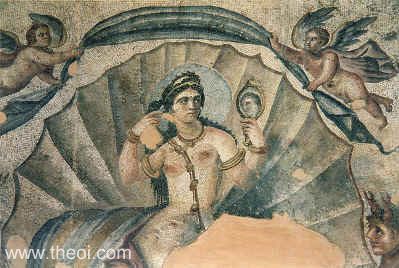
Hesiod, Theogony 176 ff (trans. Evelyn-White) (Greek epic C8th or C7th B.C.)
:
"And with her [Aphrodite] went Eros (Love), and comely Himeros (Desire) followed her at her birth at the
first and as she went into the assembly of the gods."
[N.B. Hesiod is perhaps suggesting that Eros and Himeros were born with or from the goddess at her birth.]
The Anacreontea, Fragment 57 (trans. Campbell, Vol. Greek Lyric II) (Greek lyric C5th
or C4th B.C.) :
"[Aphrodite] roaming over the waves like sea-lettuce, moving her soft-skinned body in her voyage over the
white calm sea, she pulls the breakers along her path. Above her rosy breast and below her soft neck a great
wave divides her skin. In the midst of the furrow, like a lily wound among violets, Kypris (Cypris) [Aphrodite]
shines out from the clam sea. Over the silver on dancing dolphins ride guileful Eros (Love) and laughing Himeros
(Desire), and the chorus of bow-backed fish plunging in the waves sports with the Paphian where she swims."
Pausanias, Description of Greece 5. 11. 8 (trans. Jones) (Greek travelogue C2nd A.D.)
:
"[Among the reliefs decorating the throne in the temple of Zeus at Olympia :] On the pedestal supporting
the throne and Zeus with all his adornments are works in gold : . . . Eros (Love) receiving Aphrodite as she
rises from the sea, and Aphrodite is being crowned by Peitho (Persuasion)."
Quintus Smyrnaeus, Fall of Troy 5. 70 ff (trans. Way) (Greek epic C4th A.D.)
:
"Out of the sea was rising lovely-crowned Kypris (Cypris) [Aphrodite], foam-blossoms still upon her hair;
and round her hovered smiling witchingly Himeros (Desire), and danced the Kharites (Charites, Graces)
lovely-tressed."
ANCIENT GREEK & ROMAN ART
SOURCES
GREEK
- Hesiod, Theogony - Greek Epic C8th - 7th B.C.
- Greek Lyric I Sappho, Fragments - Greek Lyric C6th B.C.
- Greek Lyric II Anacreon, Fragments - Greek Lyric C6th B.C.
- Greek Lyric II Anacreontea, Fragments - Greek Lyric C5th - 4th B.C.
- Greek Lyric III Simonides, Fragments - Greek Lyric C6th - 5th B.C.
- Greek Lyric IV Bacchylides, Fragments - Greek Lyric C5th B.C.
- Greek Lyric IV Ion of Chios, Fragments - Greek Lyric C5th B.C.
- Greek Lyric IV Folk Songs, Fragments - Greek Lyric B.C.
- Plato, Cratylus - Greek Philosophy C4th B.C.
- Pausanias, Description of Greece - Greek Travelogue C2nd A.D.
- Quintus Smyrnaeus, Fall of Troy - Greek Epic C4th A.D.
ROMAN
- Ovid, Fasti - Latin Poetry C1st B.C. - C1st A.D.
BIBLIOGRAPHY
A complete bibliography of the translations quoted on this page.

